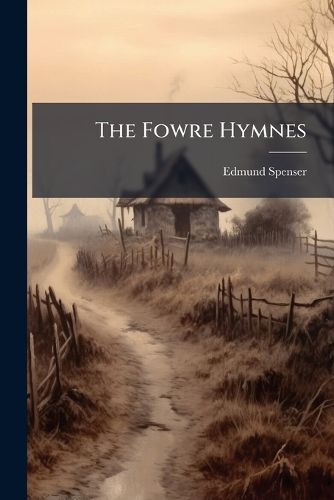Readings Newsletter
Become a Readings Member to make your shopping experience even easier.
Sign in or sign up for free!
You’re not far away from qualifying for FREE standard shipping within Australia
You’ve qualified for FREE standard shipping within Australia
The cart is loading…






"The Fowre Hymnes" by Edmund Spenser is a collection of four poems celebrating divine love and beauty. Composed during the late 16th century, these works-'An Hymne in Honour of Love, ' 'An Hymne in Honour of Beauty, ' 'An Hymne of Heavenly Love, ' and 'An Hymne of Heavenly Beauty'-reflect Spenser's evolving philosophical and spiritual views. The first two hymns explore earthly love and beauty, while the latter two ascend to the contemplation of divine ideals.
Spenser's rich allegorical style and masterful use of language make these hymns a significant contribution to English Renaissance literature. "The Fowre Hymnes" offer readers a profound exploration of love, beauty, and the spiritual journey, showcasing Spenser's poetic genius and his engagement with Neoplatonic thought.
This work has been selected by scholars as being culturally important, and is part of the knowledge base of civilization as we know it. This work was reproduced from the original artifact, and remains as true to the original work as possible. Therefore, you will see the original copyright references, library stamps (as most of these works have been housed in our most important libraries around the world), and other notations in the work.
This work is in the public domain in the United States of America, and possibly other nations. Within the United States, you may freely copy and distribute this work, as no entity (individual or corporate) has a copyright on the body of the work.
As a reproduction of a historical artifact, this work may contain missing or blurred pages, poor pictures, errant marks, etc. Scholars believe, and we concur, that this work is important enough to be preserved, reproduced, and made generally available to the public. We appreciate your support of the preservation process, and thank you for being an important part of keeping this knowledge alive and relevant.
$9.00 standard shipping within Australia
FREE standard shipping within Australia for orders over $100.00
Express & International shipping calculated at checkout
Stock availability can be subject to change without notice. We recommend calling the shop or contacting our online team to check availability of low stock items. Please see our Shopping Online page for more details.
"The Fowre Hymnes" by Edmund Spenser is a collection of four poems celebrating divine love and beauty. Composed during the late 16th century, these works-'An Hymne in Honour of Love, ' 'An Hymne in Honour of Beauty, ' 'An Hymne of Heavenly Love, ' and 'An Hymne of Heavenly Beauty'-reflect Spenser's evolving philosophical and spiritual views. The first two hymns explore earthly love and beauty, while the latter two ascend to the contemplation of divine ideals.
Spenser's rich allegorical style and masterful use of language make these hymns a significant contribution to English Renaissance literature. "The Fowre Hymnes" offer readers a profound exploration of love, beauty, and the spiritual journey, showcasing Spenser's poetic genius and his engagement with Neoplatonic thought.
This work has been selected by scholars as being culturally important, and is part of the knowledge base of civilization as we know it. This work was reproduced from the original artifact, and remains as true to the original work as possible. Therefore, you will see the original copyright references, library stamps (as most of these works have been housed in our most important libraries around the world), and other notations in the work.
This work is in the public domain in the United States of America, and possibly other nations. Within the United States, you may freely copy and distribute this work, as no entity (individual or corporate) has a copyright on the body of the work.
As a reproduction of a historical artifact, this work may contain missing or blurred pages, poor pictures, errant marks, etc. Scholars believe, and we concur, that this work is important enough to be preserved, reproduced, and made generally available to the public. We appreciate your support of the preservation process, and thank you for being an important part of keeping this knowledge alive and relevant.